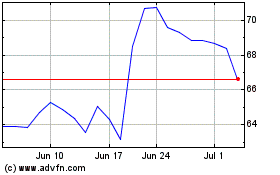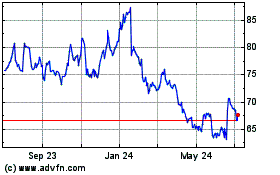Gilead to Boost Stake in Belgian Biotech Galapagos as Part of $5.1 Billion Deal
July 14 2019 - 12:35PM
Dow Jones News
By Jonathan D. Rockoff and Cara Lombardo
Gilead Sciences Inc. will pay $5.1 billion to boost its stake in
Galapagos NV and gain rights outside Europe to the Belgian
biotechnology company's treatments in development, in a broad
research collaboration aimed at increasing growth at the
drugmakers.
Under the terms of the deal, to be announced Sunday, Gilead will
make a $3.95 billion payment to Galapagos. It also will invest $1.1
billion, or EUR140.59 ($158.49) a share, to increase its stake in
the drugmaker to 22% from 12.3%. That represents a 20% premium to
the 30-day weighted average share price of Galapagos, which trades
in Amsterdam and on Nasdaq and has a market value of around $7.9
billion.
Assuming Galapagos shareholders sign off, Gilead could
eventually boost its ownership stake to as much as 29.9%, officials
of the companies said in interviews over the weekend. Gilead will
get two seats on Galapagos's board of directors as part of the
deal.
Gilead, which has been looking for new products to regain its
once-heady sales growth, is securing access for a decade to one of
the industry's most promising but also risky pipelines. Galapagos
has six compounds in human testing, including potential drugs for
conditions such as knee osteoarthritis and pulmonary fibrosis that
would sell in multibillion-dollar markets.
Galapagos, meanwhile, gets a large infusion of cash to advance
its drug-research efforts. The deal also could help Galapagos
remain independent since Gilead will agree not to make a bid for
more than 29.9% of the company over the course of the agreement,
and other potential suitors would likely be turned off by Gilead's
deep involvement with the company.
The companies know each other well: For more than three years,
they have partnered on development of a drug for rheumatoid
arthritis. They expect to seek approval to sell that drug,
filgotinib, by the end of the year. As part of the broader
collaboration they undertaking, Galapagos will get expanded
European commercial rights to the drug, which analysts say could be
a big seller.
Gilead, based in Foster City, Calif., is under pressure to keep
its roughly $22 billion in annual revenue from declining further.
Its top line has fallen from a peak of $33 billion in 2015 amid
slowing sales of its blockbuster hepatitis C offerings including
Sovaldi and Harvoni. In 2017, Gilead spent around $11 billion to
buy Kite Pharma Inc., which specializes in a new kind of cancer
treatment, but sales of its drug Yescarta have been
disappointing.
Instead of pursuing a full-blown takeover of Galapagos, however,
Gilead has opted for an unusual -- although not unheard of --
research partnership.
Among the big pharmaceutical companies that have struck such
broad-based research deals are Sanofi SA, whose deal with Regeneron
Pharmaceuticals Inc. has produced a number of approved drugs and
significant sales for each company.
The Galapagos partnership would be among the first notable
transactions for Daniel O'Day, Gilead's new chief executive, who
had firsthand experience with perhaps the most successful research
collaboration in the industry, a tie-up between Roche Holding AG
and biotech Genentech. Mr. O'Day came to Gilead in March from
Roche, where he also played a role in its research partnership with
Japanese drugmaker Chugai Pharmaceutical Co.
Mr. O'Day said in an interview that the structure of the deal
ensures Galapagos's independence and allows Gilead to protect the
value of its investment.
"Megamergers can often distract the organization from pursuing
the science and following the innovation," he said. "I prefer a
transaction like this."
Galapagos, of Mechelen, Belgium, has sought to discover the
first drugs to treat intractable diseases through a novel program,
which looks for new targets by exploring what happens in diseased
human cells when genes are revved up or down. Then the company
develops so-called small-molecule drugs to hit these new targets.
If the drugs work, the payoff could be huge, but there is a risk
they won't because the research is so cutting edge.
Gilead shares a focus on small-molecule drugs and the company
has been exploring some of the same areas as Galapagos, such as
fatty-liver disease, which is marked by the buildup of scar
tissue.
Galapagos Chief Executive Onno van de Stolpe said the companies
began seriously considering expanding their partnership earlier
this year.
Write to Jonathan D. Rockoff at Jonathan.Rockoff@wsj.com and
Cara Lombardo at cara.lombardo@wsj.com
(END) Dow Jones Newswires
July 14, 2019 12:20 ET (16:20 GMT)
Copyright (c) 2019 Dow Jones & Company, Inc.
Gilead Sciences (NASDAQ:GILD)
Historical Stock Chart
From Mar 2024 to Apr 2024

Gilead Sciences (NASDAQ:GILD)
Historical Stock Chart
From Apr 2023 to Apr 2024
